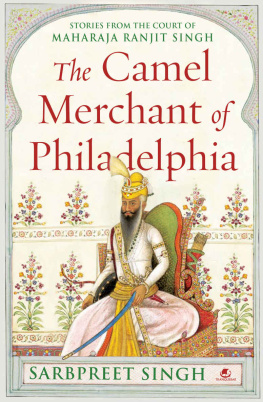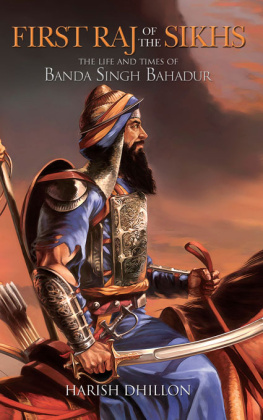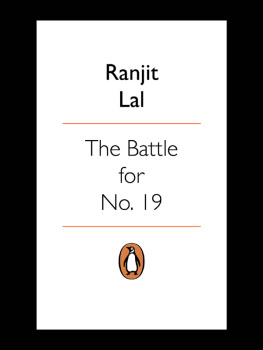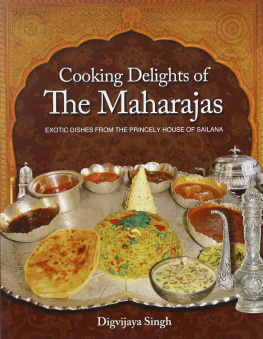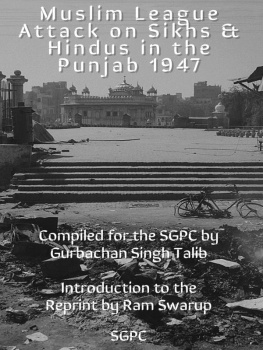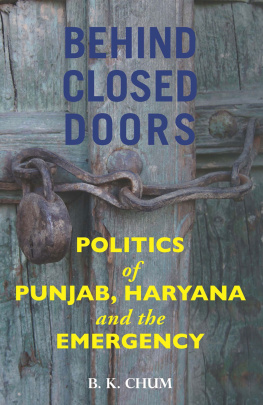
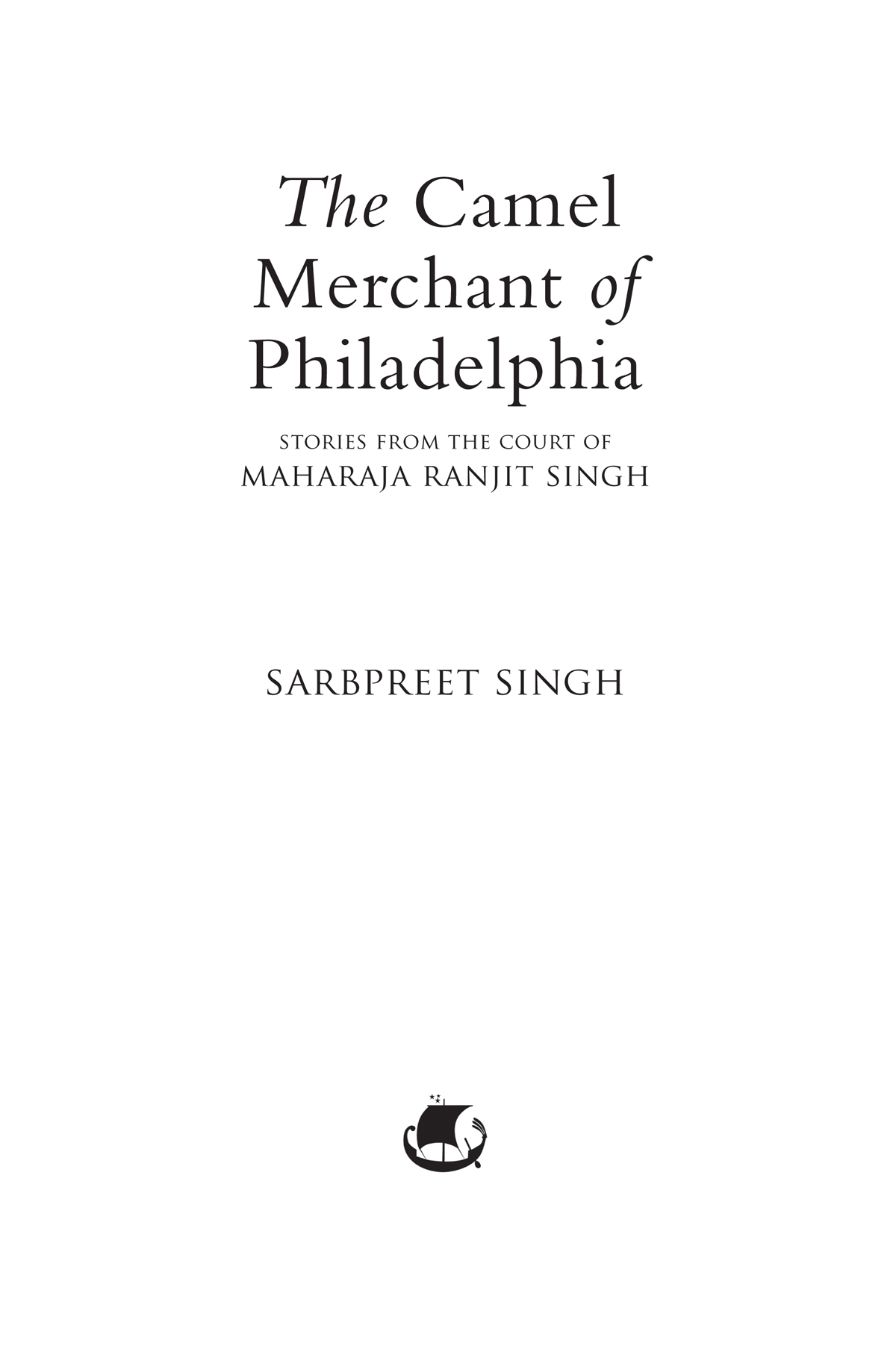

First published in Tranquebar by Westland Publications Private Limited in 2019
1st Floor, A Block, East Wing, Plot No. 40, SP Info City, Dr. MGR Salai,Perungudi, Kandanchavadi, Chennai 600096
Tranquebar, the Tranquebar logo, Westland and the Westland logo are the trademarks of Westland Publications Limited, or its affiliates.
Copyright Sarbpreet Singh, 2019
ISBN: 9789388689472
All rights reserved
The views and opinions expressed in this work are the authors own and the facts are as reported by him, and the publisher is in no way liable for the same.
No part of this book may be reproduced, or stored in a retrieval system, or transmitted in any form or by any means, electronic, mechanical, photocopying, recording, or otherwise, without express written permission of the publisher.
CONTENTS


The Camel Merchant of Philadelphia came into being quite serendipitously. Growing up in Gangtok, Sikkim, far from Punjab, the Sikh homeland, I did not have much of an understanding or appreciation of Sikh history. There were hardly any Sikhs in Sikkim; other than a few army officers and civil servants who would be posted there occasionally, there were literally two Sikh families in Gangtok! My high school history books mentioned Sikhs only in passing and I never really learned about Maharaja Ranjit Singh or his empire.
I left India for the U.S. as a young man to attend graduate school and then stayed on to build a career in technology and business. I was in my mid-twenties, when quite by chance I happened upon a copy of History of the Sikhs, written by J.D. Cunningham, a Scotsman who served the East India Company, in 1849. By then I had read a few books on Sikh history, but I found Cunninghams work to be particularly engaging, especially the sections of the book that addressed events in the nineteenth century, which the author was an eyewitness to. That was my first memorable encounter with the romance and tragedy of the Sikh empire of Maharaja Ranjit Singh and his colourful court, the Lahore Durbar.
Several years later, teaching history at Sunday school to Sikh teenagers born in the diaspora, I had the opportunity to revisit the stories that had captivated me so, as a young man. Teaching history to a group of jaded teens can be a challenging task and one summer, I decided to write a play about the life and times of Maharaja Ranjit Singh, hoping that it might spark their interest. This led me to start collecting references and on a visit to Amritsar, I ventured into the well-known Singh Brothers bookshop and managed to acquire a translation of the Umdut Ut Twarikh, an account of the Lahore Durbar written in Persian by Sohan Lal Suri, the courts official diarist and scribe.
Embedded in the quotidian accounts of the dealings of the Durbar and the administration, I started to find little anecdotal nuggets that made the personalities that peopled Ranjit Singhs court truly come alive. The result of my efforts was a Punjabi play named Sarkar, which I then proceeded to direct and present with my teenaged students portraying the Maharaja, his courtiers and his family. All those teenagers are now busy professionals and while I am sure that they have forgotten most of what they learned at Sunday school, I like to think that the stories of the Lahore Durbar have stayed with them because of their participation in the play.
My thoughts would often return to the stories I had read: the improbable rise of Ranjit Singh, the scion of a petty fiefdom, to dizzying heights of power; the influence that his mother-in-law, Sada Kaur had on him and the outsized role she played in his success despite living in a patriarchal society where women were practically powerless and their falling out and her miserable end; the larger than life characters of Ranjit Singhs time such as the obstreperous Akali Phoola Singh who served Ranjit Singh but feared and obeyed none save the Divine.
Particularly fascinating to me were the accounts of the European and American adventurers who were drawn to Ranjit Singhs court and served him with great distinction: the chevaliers Jean Francois Allard and Jean Baptiste Ventura, who created the Durbars vaunted French Legion and went on to become his most trusted generals; the adventurer Alexander Gardner, who was eyewitness to many tumultuous events in the history of the empire; the Quaker, Josiah Harlan, an interesting character who had improbable adventures in Punjab and Afghanistan and who is the subject of the title story.
The breathtaking collapse of the empire after Maharaja Ranjit Singhs death, to me, seemed as gripping as any Greek or Shakespearean tragedy. Surely, the tales could not have been more compelling if the Bard himself had crafted them!
In a conversation with my friend and mentor, T. Sher Singh, a writer who holds the distinction of being the first turbanned Sikh attorney in Canada, I remember sharing my fascination with the Durbar with him and musing that these stories would be perfect for films and television in particular, given the global openness today to embracing compelling stories regardless of their origin. He then suggested that I write a novella that could form the basis of a screenplay or a multi-part television series.
This conversation sent me back to seek more references for my research and pretty soon, I was knee-deep in first person accounts by travellers who had visited the Lahore Durbar and had witnessed its glory and its idiosyncrasies with their own eyes. This work was informed by my immersion in the writings of travellers like Victor Jacquemont, Baron Charles Hugel, Rev. Joseph Wolffe, Mohan Lal Kashmiri and several others. The accounts of Alexander Gardner, Colonel Steinbach, Dr. Honigberger and others who served the Durbar and those of British visitors such as W.L. McGregor, W.G. Osborne and George Carmichael Smyth provide much of the colour in these stories. I also read accounts of Maharaja Ranjit Singh written in Punjabi, most notably Raj Khalsa by Gyani Gian Singh and Sher Punjab Maharaja Ranjit Singh by Baba Prem Singh Hoti Mardan, which provided a somewhat different perspective.
After the fall of Ranjit Singhs empire and its annexation by the British, many more accounts were written by the victors, laden with every form of calumny, most likely in justification of the usurping of an allys kingdom. In sharp contrast, Sikh writers later wrote glowing hagiographies of Ranjit Singhs reign, celebrating what they saw as a golden period in Sikh history.
The Camel Merchant of Philadelphia:Stories from the Court of Maharaja Ranjit Singh is an examination of Ranjit Singh and his time through a study of the colourful characters who populated his court. All these stories combine to present a nuanced and complex image of Maharaja Ranjit Singh through his interactions with these characters. The ultimate objective of this work is to humanise Maharaja Ranjit Singh and present him as the brilliant man he clearly was, without attempting to gloss over his flaws and foibles.
Next page
